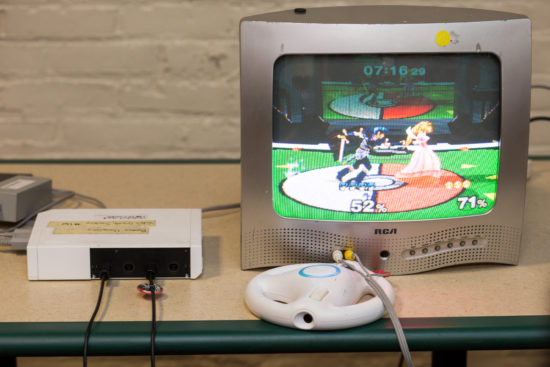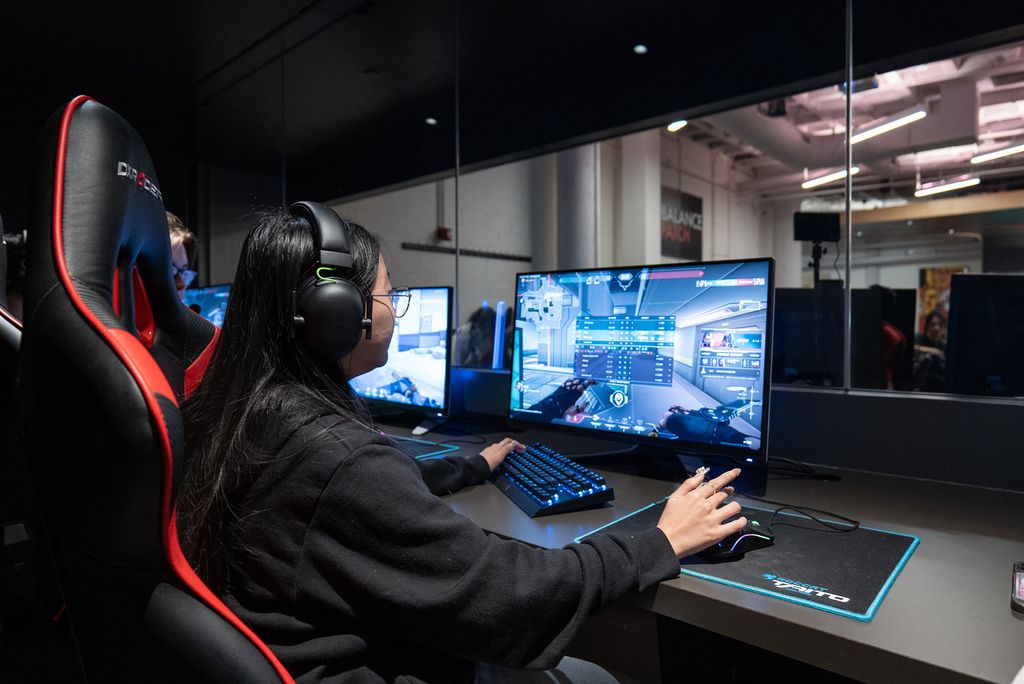BU Smash Bros. Society Thrives on Nintendo Mayhem
It’s a fighting game, but they all get along
Recognize the Super Jump Punch, the Witch Twist, and the Peanut Popgun? Then you may have what it takes to be a member of the BU Smash Bros. Society.
For the uninitiated, those are all fighting moves in Super Smash Bros., the popular series of crossover fighting games from Nintendo featuring characters from many of its other successful franchises, including Mario, Donkey Kong, The Legend of Zelda, and Pokémon. Launched way back in 1999 for the Nintendo 64, Smash (as it’s known to afficionados) has been through several iterations on subsequent game consoles.
Super Smash Bros. Melee, released in 2001 for the GameCube, became the system’s best-selling game and the franchise’s biggest enduring hit, blowing up in recent years to include lucrative tournament play. And one big reason is not what you’d expect.
“Melee is kind of a broken game, but that makes it more fun in a way,” says society member Rachel Yang (ENG’20). “There are techniques people have invented or figured out that aren’t in the official guidebook, glitches players discovered that have been exploited since, which I think is really funny. There’s even a trick with one character that if you time it right with a grab, you can get your opponent into this infinite loop of hits. As long as you press the buttons in a certain rhythm, you can pretty much hit them infinitely and kill them right away.”
The other popular iteration is the 2014 Super Smash Bros. for Nintendo 3DS and Wii U, known to players as Smash 4, which is a little bit slower, but also more polished, with a lot more characters. Fans of both Smash games became the largest faction in the BU Video Game Society over the last few years, leading the club to change its name last year to the BU Smash Bros. Society.
Melee players meet Fridays from 4 to 9 pm in the South Campus residence hall basement at 518 Park Drive, while the Smash 4 contingent gathers Saturdays in CAS 226 from 2 to 7 pm. Meetings tend to start with a couple of hours of friendly competition before moving to a formal bracket.
The object of Smash is to knock your opponent out of the boundaries of the fight stage. “Melee falls into the fighting game category, but it’s unique in that it’s more free-form,” says Yang. “Once you start getting more comfortable with the way your character moves, you have a lot of control—where you want them to go and how exactly they hit the enemy.”

“Smash is simple, colorful, you can do a lot, it has a lot of replay value,” says Smash 4 partisan Guillermo Ravelo (CAS’19), society vice president. “You also have the social aspect. Unlike computer games, console gaming has the couch experience too. It doesn’t matter if it’s competitive or casual, you have people right next to you and you’re having a blast with them.”
That requires a civility that’s often missing in online gaming, says club president Kiran Chana (CAS’18): “Of all the gaming communities you can join, I think Smash is the best, because it is a social experience and there’s no room for that negative toxic online stuff.”
One not-so-great thing Smash seems to have in common with other video games: “There is a huge gender disparity in the Melee scene,” says Yang, who says she’s often the only woman involved.
And while Smash 4 works just fine with current TV technology, that’s not the case with Melee.
The older console systems plugged into TVs by component cables that are not compatible with new TVs, says Chana. “So we started lugging around these massive TVs from god knows when, some of them older than us. The Melee events we run here, we’re moving around five, six, seven classic old-school tube TVs, very heavy, very off-balance. We’ve dropped plenty—but these TVs survive. We’ve got cracked TVs that we taped up or the screen fell off and we duct-taped it back on, and they still work.”
The terms of Chana, Ravelo, and the other society officers ended with the school year, and they handed over leadership to a new team, led by incoming president Christian Metzger (Questrom’20), a Melee player, and incoming vice president Ryan Li (CAS’20), a Smash 4 player.
For more info on the BU Smash Bros. Society, email busmashbrossociety@gmail.com, or check the group out on Facebook and twitch.
Joel Brown can be reached at jbnbpt@bu.edu. Aaron Hwang can be reached at aahwang@bu.edu.
This Series
Also in
BU Clubs
-
October 27, 2023
Video: Skateboarding with BU Girls Skate
-
May 3, 2022
Promoting the Beauty of Natural Hair
-
April 27, 2022
Yes, BU Has an Equestrian Team. And It Just Had a Record Season

Comments & Discussion
Boston University moderates comments to facilitate an informed, substantive, civil conversation. Abusive, profane, self-promotional, misleading, incoherent or off-topic comments will be rejected. Moderators are staffed during regular business hours (EST) and can only accept comments written in English. Statistics or facts must include a citation or a link to the citation.